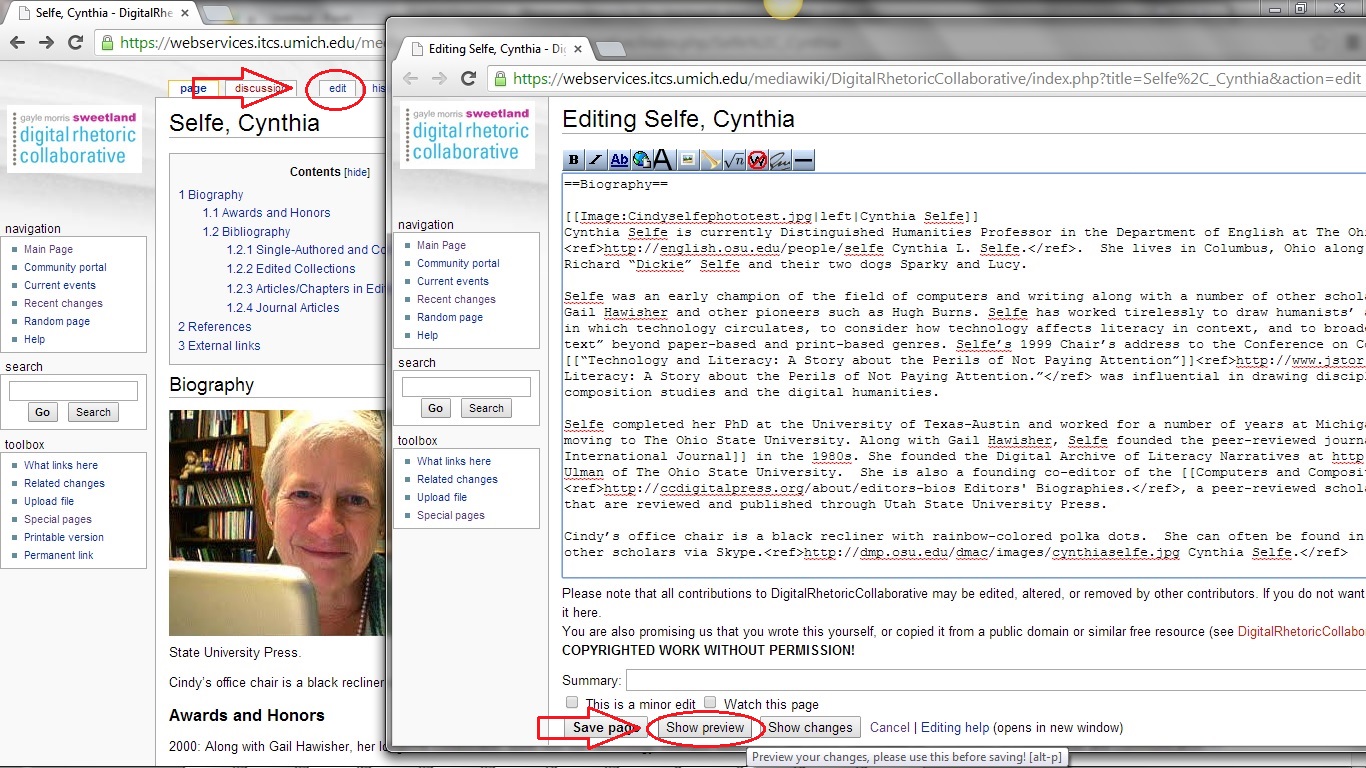We’re celebrating the 20th birthday of the wiki this year by talking about wikis and expanding the DRC Wiki.
Last week, we talked about how we hope the wiki can be useful to students, instructors, and administrators working with digital rhetoric, computers and composition, digital humanities, composition studies, and other related fields.
This week, we’re talking about the different contributions DRC Wiki editors can make. As we’ll see in the list of possible contributions below, contributing to a wiki doesn’t mean an editor needs to make a comprehensive, dissertation-length contribution to the wiki about a topic. Instead, DRC Wiki editors can either write a short entry or simply call for an entry to be created, as described below.
If you haven’t already signed up, we invite you to become a DRC Wiki editor! Information on signing up can be found here.
Editing the DRC Wiki: After getting an account, it all starts with the Edit button!
Ways You Can Edit the DRC Wiki
1. Know what you want to write about, but don’t see it on the wiki? Then write a new article! Here’s help on writing a new article: Starting a New Page.
2. Want to make a contribution, but worried you don’t know wiki markup? Take a look at the help and look at existing pages through the Edit mode (just click the Edit button) to see how other pages work. After making changes to an entry, use the Show Preview before clicking the Save page to see if you like your edits.
 Editing the DRC Wiki: After making changes, use the Show Preview before clicking the Save page to see if you like your edits.
Editing the DRC Wiki: After making changes, use the Show Preview before clicking the Save page to see if you like your edits.
3. Want to write an article, but don’t know what to write about? Here’s a list of articles other DRC Wiki editors have requested be added to the wiki: Wanted Pages. And any place you see a red link on the wiki also is a topic where the DRC needs your help!
Editing the DRC Wiki: Entries in red need editors!
4. Don’t have time to write a new article, but want to add a bit about the topic to the wiki? Then create a stub. A stub is a short article that contains one or a few sentences of useful text that could—and probably should—be expanded to offer coverage of the topic. Here’s an example of one of our existing stub articles: Computers and Writing
5. Curious about a topic, but don’t currently have the time or feel the expertise to write an article or stub? Create a call for an article. Simply find the page where you think the topic fits (is it about a person? A journal? A concept? Check the DRC Wiki main page for major organizational areas), click Edit, and add the topic in wiki markup brackets like this: [[Ball, Cheryl]]
Editing the DRC Wiki: Add links to new or existing pages to other pages using double brackets [[Name of page to add/link]].
6. Touch up an article. Maybe you see a few sentences to add to the topic. Or maybe it’s in need of editing. Or it could be formatted differently or something is wrong with the wiki markup. You may come across this as you look at the wiki or you can see this list of Pages with the Fewest Revisions.
7. Add references or external links to an existing article. Here’s an example of references and external links on Cynthia Selfe. To find an existing article for which you know of helpful resources, access the Search box on the main page, type in your term, and click Search. Choose a page and add the references to the appropriate area or simply list external links at the bottom of the entry.
Search the DRC Wiki to locate search terms
8. And, as always, we invite you to share this post and the call to become a DRC Wiki Editor with others!
Please Share Our Post!
9. Leaves us a comment about other ways editors can contribute to the DRC Wiki!
See you next week for another Wiki Wednesday!
